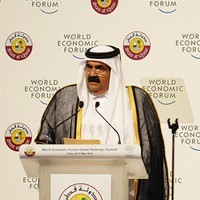Inch for square inch, no country in the Middle East wields as much influence as the minuscule and fabulously wealthy Emirate of Qatar. The emirate measures less than half the size of New Hampshire and sits on a most inhospitable piece of land. But its audaciously assertive leadership has leveraged Qatar's two assets, money and location, to turn the tiny peninsula into a major player.
Qatar has become a key mover of events in the fast-changing Arab world. Until recently, Emir Hamad bin Khalifa al-Thani has exercised his influence by strategically deploying money and diplomatic resources. Now, he has decided to add real firepower to his already not-so-soft power.
Doha's regional influence has unfolded gradually but firmly. In 1996, it launched the satellite TV channel Al Jazeera, which discomfited rulers and stirred the public throughout the Arab world. In 2003, it welcomed American forces to the emirate, allowing the U.S. to open a sprawling military base on its territory within slingshot distance of Iran, just across the Persian Gulf. And then, last year, it took a leading role in promoting the rising power of Islamist elements within the Arab uprisings, leaving observers scratching their heads.

